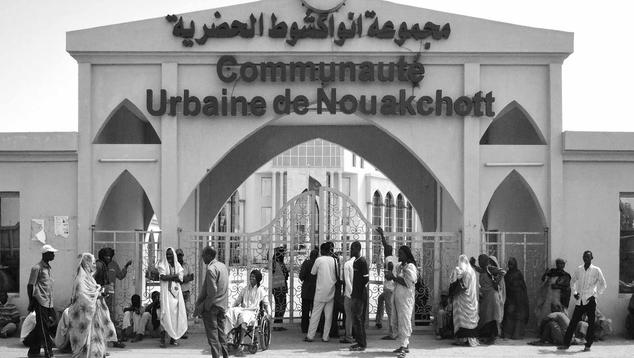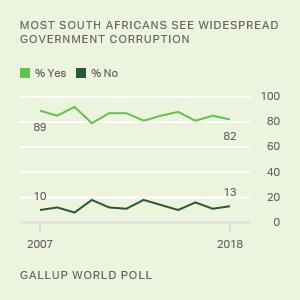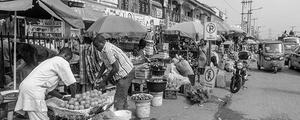Story Highlights
- 58% of Mauritanians are not confident in their national government
- 64% lack confidence in the honesty of elections
WASHINGTON, D.C. -- Heading into the first round of their country's presidential election this weekend, which offers the first opportunity in more than a decade to bring change to a nation plagued by military coups, Mauritanians have little confidence in their national government and in the honesty of their country's elections. Nearly six in 10 Mauritanians (58%) say they are not confident in their national government, and 64% lack confidence in the honesty of elections.
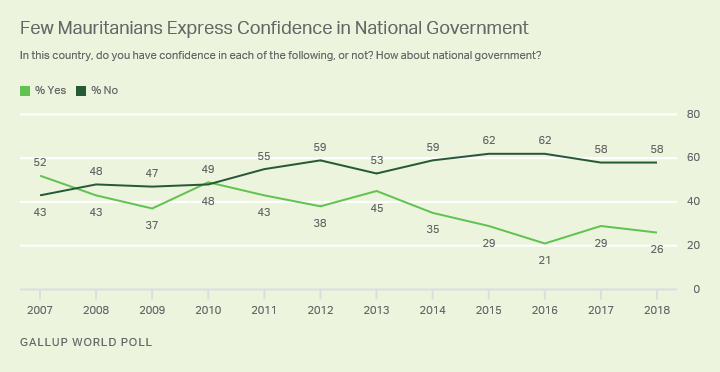
Mauritanians' confidence levels are on the lower end of what Gallup has seen over the past decade in the country, and they are also low compared with other countries in the Sahel region of Africa. Confidence in each country's national government ranges from 73% in Niger to 51% in Mali, while confidence in the honesty of elections is highest in Niger (65%) and lowest in Chad (42%).
However, the low confidence in Mauritania's leadership is not a new phenomenon. Confidence in the national government dipped into net-negative territory in 2008, right before the military coup that brought the country's current president, Mohamed Ould Abdel Aziz, into power. Abdel Aziz was subsequently elected in Mauritania's 2009 presidential election, and Mauritanians' confidence in their national government climbed to 49% the following year. By late 2014, several months after Abdel Aziz won a second term in a landslide victory, Mauritanians' confidence in their national government dropped to 35%. Since then, fewer than three in 10 have expressed confidence in their national government.
Current levels of confidence in the government are highest (though still quite low overall) among older Mauritanians, those aged 45 and older, with 34% expressing confidence -- compared with 23% of those aged 15 to 44.
Few Mauritanians Confident in the Honesty of Elections
In addition to a general lack of confidence in their government, most Mauritanians also question the honesty of their country's elections. Leading up to the 2008 military coup, confidence in the honesty of elections had already dropped from 55% to 34%, and it has stayed at or below that level since. The 19% of Mauritanians who express confidence in the honesty of elections ties the second-lowest point in Gallup's trend on the issue.
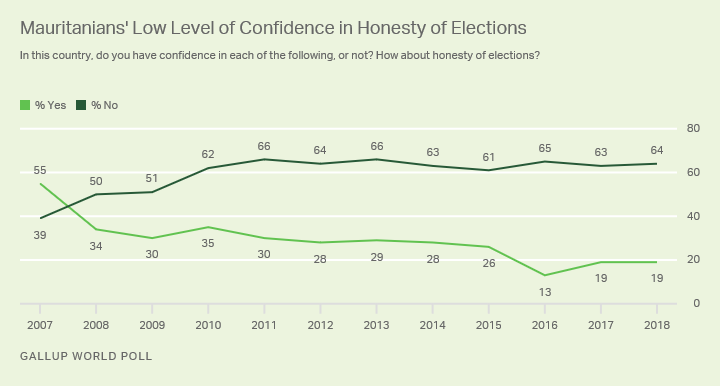
As with confidence in their government, Mauritanians aged 45 and older are more likely to have confidence in their electoral process (32%), compared with 15% among those aged 15 to 44.
Low Confidence in Institutions Coupled With Economic Woes
Along with the dismal levels of confidence in the country's government and elections, Mauritanians express a bleak view of their current economic situation. Nearly half (48%) say it is a bad time to find a job in their local area. For the entirety of Gallup's trend, since 2007, at least 40% of Mauritanians have said it is a bad time to find a job in their area. However, the percentage saying it is a good time has fluctuated. The current 25% saying it is a good time to find a job is the second-lowest reading in the trend.
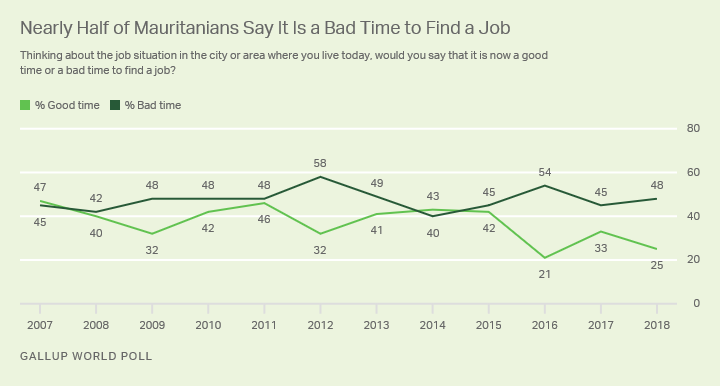
In addition to their poor assessments of the local job market, many Mauritanians are negative about the overall state of their local economy -- despite government reforms to improve economic conditions and the steady GDP growth of the last three years. In 2018, one in three Mauritanians (33%) said their local economy is getting worse, while 29% said it is getting better.
Implications
The current president has abided by the terms of the Mauritanian constitution, which limit the executive to two terms. Thus, the impending presidential election offers Mauritanians the first opportunity to elect a new leader in more than a decade, potentially priming the country for change.
Their relatively low level of confidence in the government suggests Mauritanians are looking for major changes in how the country is being run and for improvements in their local economic conditions. At the same time, their lack of confidence in the honesty of elections may suggest that most Mauritanians are skeptical that true change can occur through the ballot box. The next government will need to work hard to rebuild Mauritanians' confidence in key institutions and prioritize initiatives that improve people's lives in tangible ways.
For complete methodology and specific survey dates, please review Gallup's Country Data Set details.
Learn more about how the Gallup World Poll works.
